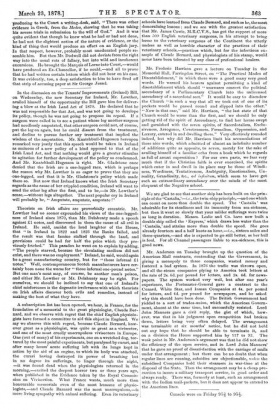Theorists on Irish affairs are proverbially eccentric. Mr. Lowther had
no sooner expounded his views of the one-legged- ness of Ireland since 1870, than Mr. Delahunty made a speech against £1 notes, and discovered in them the cause of all evil in Ireland. He said, amidst the loud laughter of the House, that " in Ireland in 1822 and 1823 the Banks failed, and the result was that famine stalked through the land, and provisions could be had for half the price which they pre- viously fetched." This paradox he went on to explain by adding, ." The people starved, because the circulating medium did not exist, and there was no employment." Ireland, he said, would again be a great manufacturing country, but for " those infernal £1 notes." Well, contemporaneous Scotch manufacturers have cer- tainly been none the worse for " those infernal one-pound notes." But one man's meat may, of con rse, be another man's poison, and either Mr. Lowther or Mr. Delahunty may be right. For ourselves, we should be inclined to say that one of Ireland's thief misfortunes is the dogmatic irrelevance with which theorists on Irish affairs discover both evils and remedies, instead of making the best of what they have.


































 Previous page
Previous page